Hotel Property Management Systems: Products and Features
Reading time:
18
minutes
What does a hotel business need to survive in a competitive market? At least two things: Have an online presence that makes the reservation process easier and deliver outstanding customer service so that visitors returning to your area will choose your location again. Automating daily operations and administrative tasks is an important part of achieving customer satisfaction as it helps provide reliable and quality service time after time.
A hotel is a complex system that encompasses the activities of many departments, and every operation must be tracked. For this purpose, hoteliers utilize various tools including spreadsheets, paper forms, and unified property management systems.
In this article, we’ll talk about property management systems (PMSs) that handle reservations, front- and back-office operations, channel management, and more. You’ll learn about the main functions of PMSs, compare products available from different providers, and receive recommendations on how to choose the most suitable system for your hospitality business.
Mục lục bài viết
What is a property management system?
A property management system (PMS) is software that facilitates a hotel’s reservation management and administrative tasks. The most important functions include front-desk operations, reservations, channel management, housekeeping, rate and occupancy management, and payment processing. Although PMS software mostly controls reservation and financial transactions, it may allow you to manage housekeeping and perform human resources management as well. In general, PMS facilitates the main processes in a hotel related to internal and external operations.
Hotel Property Management System (PMS): Functions, Modules & Integrations
The first hotel property management systems were introduced back in the 1970s. But, even today, not every hotel has one. Adam Harris, CEO of Cloudbeds, mentioned the low tech adoption rate in his recent interview with Skift. “The average percentage of spend for technology in the hotel industry is like a fraction of what it should be,” Harris said. He also elaborated on the reason behind such a situation: “The number one reason why we don’t sign a customer up is not because they went to a competitor of ours; it’s because they’re afraid of the change.”
However, technology innovations have found their way into the hospitality industry. In 2015, a report “Hotel Management Software BuyerView” by Software Advice showed that only 34 percent of hotels used special software, while 25 percent still relied on pen and paper only to manage their hotels, and 16 percent had no hotel management system at all. Today, according to the Stayntouch 2022 Technology Sentiment Report, 81.7 percent of hotels have implemented at least one type of technology during the pandemic.
Hoteliers started looking for innovative solutions such as self-service check-in, in-room controls, mobile keys, and digital payments. Many big players have already implemented smart technologies based on the Internet of Things infrastructure. But there are still a lot of legacy systems in use.
Legacy PMS software may perform just one function, require additional modules, or be too hard to integrate with other necessary hotel management software. Consequently, hotel owners are looking for a universal, one-and-done solution to manage all the processes. Over 80 percent of respondents to the 2022 Hotel Technology Survey reported that they want to learn more about technology.
Currently, hotel property management systems are used by big hotel chains, small hostels, and everything in between. With these systems, hotels can see the booking status of rooms and control reservations. However, their functionality doesn’t end here. Via PMS, hoteliers can manage back-office processes, food and beverage services, and track room occupancy rates. Let’s take a closer look at the most common functions supported by PMS.
Main modules of property management systems
A modern property management system combines multiple work environments in a single piece of software. Depending on the provider, the combination of modules and functions can vary, and the functionality of one module can be slightly different. Additionally, some vendors sell their systems in separate modules that can be integrated with an existing solution used by a hotel. Here is the basic structure of a hotel PMS.

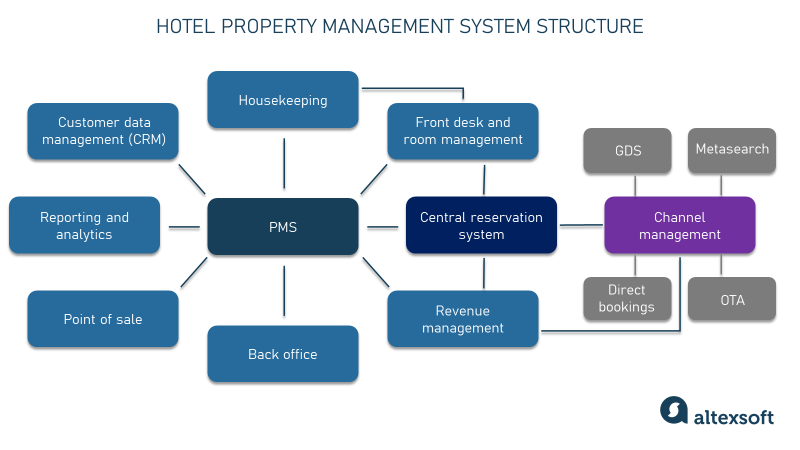
A general structure of property management system
Keep in mind that it is hard to divide the functions of PMS into more and less important because all of them are necessary. However, regardless of a property type, hotel property management systems must have a reservation system with a website booking engine and front-desk operations module. Other essential modules usually include channel management, revenue management, housekeeping, customer data management, report, and analytics. And big hotels or resorts certainly need point-of-sale (POS) services and back-office modules.
Reservation
For a modern hotel business, online bookings are in most cases the main sales channel. The reservation module, which helps manage online bookings, effectively becomes indispensable to a property management system. A central reservation system (CRS) or any other reservation platform may be available as a separate module of PMS or implemented as a hotel’s separate internal solution.
A hotel reservation system holds all inventory data and dates, sending this information to the front desk. The reservation system must be integrated with the website booking engine and other distribution channels. Chain hotels usually have one central reservation system for all properties, while independent hotels have their own reservation systems. If a hotel or a hotel chain already uses a particular reservation software, PMS must offer integration with the existing service.
Key functions of the reservation module include:
- Room bookings. The system checks room availability and status, shows free rooms across different channels and the website booking engine. This function monitors double bookings and allows group reservations. Then it schedules bookings and displays information about current and upcoming bookings on a dashboard.
- E-payments processing. Software collects online transactions and classifies them according to their types and categories.
- Management of room inventory and allocation. Reservation tools prevent overbookings and double bookings. In some software, this function is part of a channel management module.
- Reservation emails. The system sends confirmations to guests after they complete their booking. In some PMSs, this function is a part of the front-desk operations module.
- Activities booking. Some software allows guests to book not only accommodation but also activities with this system.
Front-desk operations and room management
A front-office module allows a front-desk manager to view and update room reservation status, check guests in and out, and process payments. When a guest arrives at the hotel, they want to check in as fast as possible. Support from a receptionist is very important in this case, so front-desk staff should be able to efficiently help the guest.
Some property management systems also offer integration with self-service check-in kiosks or allow checking in or out via QR code. To get a better idea of check-in automation, have a look at how Marriott and other businesses leverage digital self-services in travel.
Room status. Using a front-desk module, the front-office manager can access room status and up-to-date information about all reservations, both current and upcoming. With the help of this module, room status should be updated quickly. The front-desk module allocates rooms automatically and facilitates a room change.
Keys management. This module includes management of electronic key cards, processing payments and issuing receipts to guests.
Daily audits. The front-office module also allows users to perform night and shift audits.
In-room controls. As hotels become smarter and more tech-driven, room management gains more importance since this module also helps operate the in-room automated systems (e.g., lights, HVAC, etc.) remotely to make the room ready for a guest’s arrival.

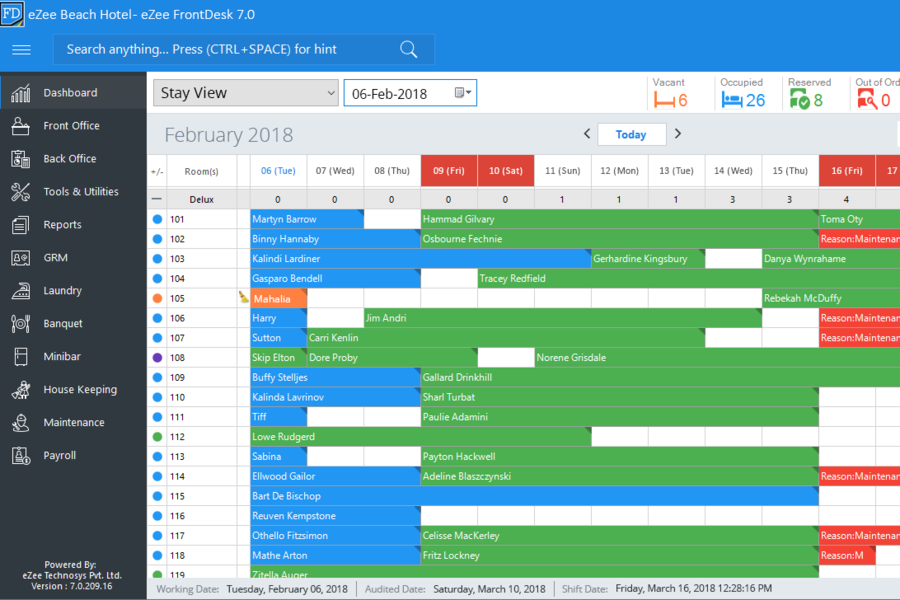
Front-desk operations interface. Source: Crozdesk
Channel management
Channel management software is a single interface to control and distribute inventories across different channels such as GDSs, OTAs, wholesalers, direct booking platforms, etc. A channel manager connects directly to a central reservation system that holds information about the availability and cost of hotel rooms, sharing this information via the distribution channels. It makes room inventory available to travelers who want to book a room or property online, listing rooms on different sources. Also, a channel management module facilitates booking-related transactions.
Different distribution channels expose inventory to different audiences. For example, connection to OTAs and some airline websites allows a larger number of potential guests to be reached, those who book flights or plan trips in advance. Metasearch sites compare prices across different channels, letting a customer make the best decision. Connections to GDSs assist non-leisure traveler booking as well as group reservations.
Direct distribution via booking engine
An important channel of distribution is a hotel’s own website with a booking engine. An online booking engine allows travelers to complete reservations directly via a hotel website bypassing travel agents and OTAs.




Here’s why direct bookings are crucial for hotels
It’s important to allow loyal guests to book directly, and website booking must be available to those who find a hotel online. A booking engine must be synchronized with the hotel website and its central reservation system, making it an additional sales channel. Usually, this module processes payments via integrated payment gateways.
In addition, booking engines often support upselling (offering room upgrades or complementing services) and packaging.
Revenue management
A PMS in and of itself is a big step towards improving hotel revenue management indicators, such as Occupancy, RevPAR (Revenue per Available Room), and ADR (Average Daily Rate), which mean a lot in evaluating a hotel’s financial success. While GDS and OTA integration helps maximize these rates, revenue management systems help a manager understand how to adjust the processes to achieve better results and control finances.
As studies prove, the majority of hoteliers realize the importance of revenue management. 2022 research by tech provider Duetto showed that 67.6 percent of respondents currently use a revenue management system and 77.6 percent expect their hotel tech investments to increase in the next three years.
The revenue management module of the PMS helps increase total room revenue using machine learning to forecast occupancy rate and decide whether to raise or lower inventory prices.
It also enables dynamic pricing. Using algorithms, this module helps hotels price the rooms based on historical data about past reservations as it monitors competitors’ rates, weather data, and local events. It improves pricing strategies, and updates prices across all distribution channels to sell more rooms at the optimal rate. To learn more about revenue management read our article on how machine learning redefines revenue management in the hotel industry.
Housekeeping
A PMS housekeeping module connects housekeeping staff to the front office. A front-office manager can make a list of tasks to assign, and housekeepers can update room status. If this is a cloud-based PMS, housekeepers can update the status of their assignments or rooms through a connected mobile app or tablet. Also, this module keeps the list of maintenance tasks and reports for the users.
The main function of this module is housekeeping management and property maintenance. Housekeeping functionality includes room status management, maid assignment for room cleaning based on a block or floor location, and keeping lists of tasks for housekeepers. Maintenance management keeps the record of hotel disruptions and repair activities with the further assignment of an attendant who can eliminate a problem.
CRM and customer data management
It is critical for hoteliers to collect and organize guest data to keep in touch with current and past customers during and after check-out. The CRM module must integrate with the front desk and reservation system, collecting all guest information from these sources. It helps store guest data and provides a database in an accessible format. Also, it includes guest contact information before and after their stay. However, if a hotel already has its own CRM system, the PMS should integrate with it.
This module can also help organize marketing activities such as promotions, measure guest experience, and automate pre- and post-stay services. The CRM module helps owners personalize the guest experience with membership and loyalty programs, which are especially important for hotel chains and resorts.
Reports and analytics
To monitor current processes and understand business performance, all business owners rely on analytics. A PMS can serve as a business intelligence tool, collecting relevant hotel data and providing hoteliers with various types of automated reports. Depending on the software, it can generate night audit reports, room and tax reports, shift audit reports, departure/arrival reports, housekeeping reports, or other ongoing summaries.
Back-office management
This PMS module facilitates management of a hotel team, back-office operations, and administrative hotel operations. Functions of a back-office management module may include
- Event management (conference and reception organization) and catering,
- Spa and gym management (sometimes it’s a separate, optional module),
- Staff management (human resources management in back and front office: shift management, staff invoicing, etc.),
- Consumption costs and hotel spendings analysis,
- Inventory analysis,
- Sales and management of promotional campaigns, and
- Reviews management.
So the back-office module facilitates internal operations, helps organize staff, and often includes accounting and other financial-related functionality.
Point-of-sale services
Most hotels have some kind of in-house restaurant, not to mention properties with gyms and spas. So, if there are multiple payment terminals in a hotel, the point-of-sale (POS) system is indispensable to collect and accurately handle transactions from different sources. With a POS module in their PMS, hoteliers can include additional charges or discounts on the final bill for each customer. Some examples of such charges are
- Spa, gyms, and other activities;
- Food and beverage services (restaurants, cafes, breakfasts); and
- In-room services, mini-bar items, TV, or Wi-Fi.
In addition to automated payment processing, a comprehensive POS module can support inventory management, collect information about customer purchasing patterns, generate sales activity reports, and keep financial data in one place.
How to choose a PMS
The choice of a PMS depends on the size and type of a hotel property, as different systems have their own sets of core features and additional modules. Most players in the market offer hotel management systems that can be customized for different types of property and basic PMS components can be complemented with modules, required for a specific type of business.
Many properties already have reservation platforms or CRSs of their own, or utilize other business management software, so it is very important for the selected PMS to be integrable with third-party products. The final choice of a property management system for a hotel is largely shaped by the functionality required.
The 2021 Smart Decision Guide to Hotel Property Management Systems by Oracle provides an evaluation checklist to help hoteliers make the right decision, scaling each factor from 1 (absolutely not important) to 10 (very important). This checklist is also very useful for comparing systems by different vendors. Regardless of hotel size and type, consider the following:

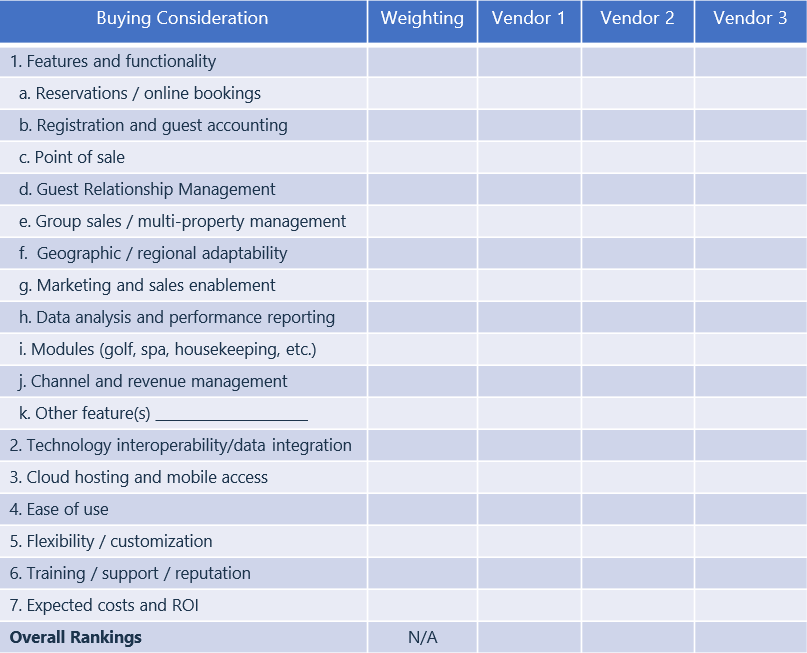 The Evaluation Checklist. Source: The 2021 Smart Decision Guide for to Hotel Property Management Systems
The Evaluation Checklist. Source: The 2021 Smart Decision Guide for to Hotel Property Management Systems
Check integration options. If there are systems already used by a hotel, or if you plan on integrating additional software, make sure that your vendor supports all necessary APIs and is ready to provide integration services. Otherwise, you may consider an external technical consultant to provide integration services.
Consider a cloud solution with mobile access. Cloud solutions are generally less expensive than on-premises software, and an owner doesn`t need to pay maintenance fees. Users of cloud software pay a subscription fee depending on the number of rooms in a hotel and modules they need. Also, cloud software is better at integrating with third-party systems like OTAs and GDSs.
On top of that, cloud-based systems can be constantly and seamlessly updated, and usually have a mobile version. Mobile access facilitates communication across departments (front-office, management, housekeeping, etc.) which helps improve customer service.

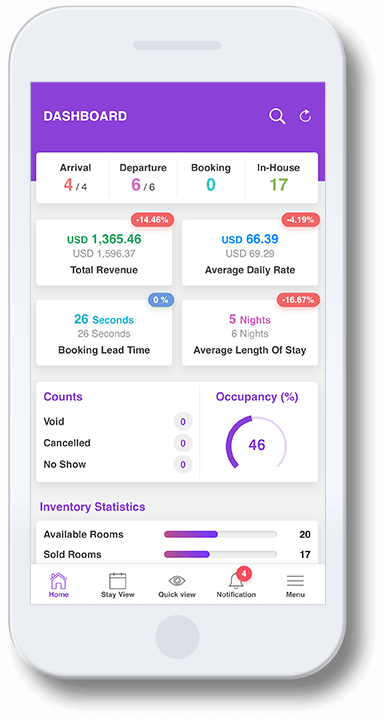
Mobile interface of a hotel PMS. Source: eZee Absolute
Prioritize the ease of use. The system’s UX will impact your employees’ learning curve. The more complex and unintuitive the interface is, the more time you have to invest in staff training and transitioning.
Pay attention to the degree of customization offered by a provider. Depending on the size and type of a property, PMS requirements may differ. For instance, if you need a bed-based management system instead of room-based in the front-office module, make sure that the PMS vendor can provide this sort of customization.
Assess customer support. Anything can happen to software, but it mustn’t affect the hotel service. Hoteliers need 24/7 access to technical support. When choosing a PMS, look for customer support reviews from fellow hoteliers or negotiate all support terms with your vendor in detail to ensure that any software outages won’t have a dramatic impact on your operations.
Calculate ROI and spendings. Whether you want to update an existing property management system, build a custom one, or buy an off-the-shelf solution, you need to decide how much you’re ready to spend on it. To make sure that the PMS will pay off, consider these key factors:
- time currently spent and how it will be reduced as a result of automation;
- how distribution and revenue will change; and
- cost of system integration and maintenance.
There are plenty of vendors who sell off-the-shelf PMSs and those who provide customization services. Trying to reach a broader audience, big vendors supplement and customize the basic PMSs so that they can be used by as many types of properties as possible. Let’s have a look at the solutions across different categories.
Please note that most systems already have channel management, reservation, and front-office functionality, so these modules are not represented in some of the comparison tables below. Also note that the categorization we offer is not absolutely precise since most platforms today are becoming more and more universal.
We’ve explored some of the popular PMS products but since we can’t describe all of them in detail in this post, we’ve compiled comparison tables and discussed several solutions to give you the idea of what to expect.
Property management systems for hotel chains and resorts
Larger properties require solutions with a wide range of modules other than the basic reservation, front office, and housekeeping. Their PMS must facilitate group bookings as well as have POS services, a multi-property management system, back-office management, revenue management, sales, and marketing functionality.
Vendors cater to the needs of large properties, adding special modules like golf and spa management. Hotels that host MICE can choose a solution that has event management and catering functionality included. Also, owners of big properties should consider PMSs with capabilities that automate check-in and checkout and offer other self-service tools.
We looked at such renowned, comprehensive tools as Oracle, 5stelle*, Clock PMS, Maestro, and others. All of them are designed to streamline operations of big hotels and hotel chains but can also be tailored to fit the needs of independent properties.
Please note that most products are highly customizable and modular. So, when purchasing such a solution, you can choose the components you need and pay only for what you selected.

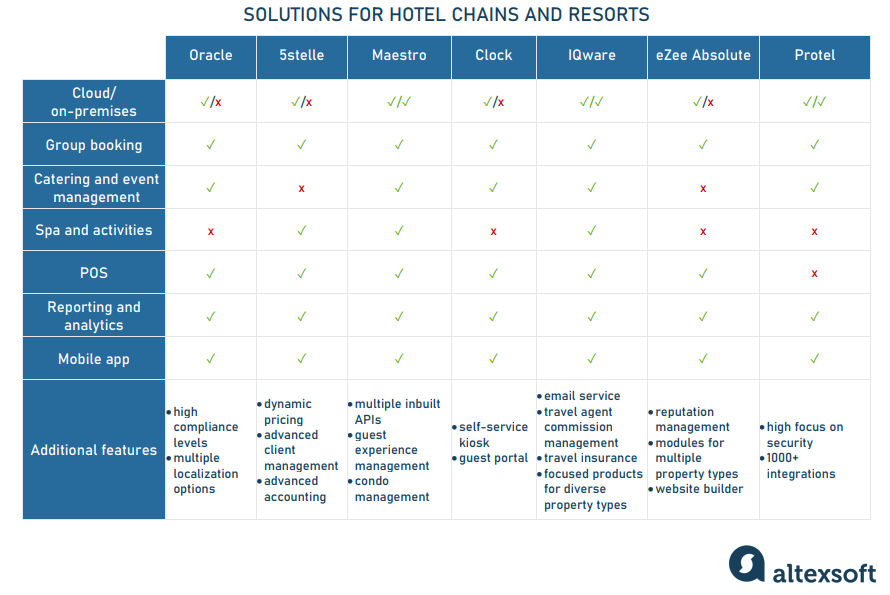
Property management systems for hotel chains and resorts
Maestro PMS
Maestro PMS is a multi-property management system with 20+ modules that can be integrated into one interface. The system provides open API (supporting over 800 third-party integrations) and GDS/OTA integration. The product is positioned as a guest-centered PMS for chain and independent hotels, resorts, and vacation rentals.
Maestro PMS is available both as a Windows app and a web browser application. It also has mobile apps for guests and hotel staff. Here’s a brief description of Maestro’s key functionality modules.
Front desk operations and CRM. This module connects reservation, housekeeping, spa, activities, sales, and guest relations management functionality in a single environment.
Sales and catering. This component supports group and event management offering multiroom operation and guest management capabilities. It facilitates sales and helps keep track of all aspects of event management, conference planning, and scheduling.
Revenue management. Maestro PMS has the Analytics & Business Intelligence data mining module for budgeting, forecasting, marketing, and reporting.
Spa and activities. This PMS has several modules for managing resorts, including Spa Management and Activities & Facilities Management that offer mobile solutions for guests, allowing them to schedule services.
Guest experience management. Maestro’s Guest Experience Management module, or GuestXMS, is focused on collecting and responding to guest feedback. It offers diverse chat options, post check-in and post checkout surveys, feedback analysis, and so on.
Other modules Maestro offers to hotels include Multi-Property Management, Housekeeping, Work Order, Guest Loyalty, Online Booking Engine, and more.
IQware PMS
Another example of a PMS for big properties is the IQpms by IQware. It is designed as a multi-property management system for properties of all sizes. Its functionality can be applied to resorts, condos, villas, vacation rentals, campgrounds, marina-resorts, and extended stays.
Like Maestro PMS, this software focuses on guest experience, offers group-booking opportunities, and provides a customizable guest app that facilitates check-ins/outs. IQpms also has the Package Management module for all-inclusive resorts or business trips.
The main functionality of this system includes the following modules.
Reservation management. Beside group management capabilities, this module offers the allotment feature that blocks the rooms for companies, airlines, tour operators, and travel agents. Also, IQpms calculates travel agent commissions automatically.

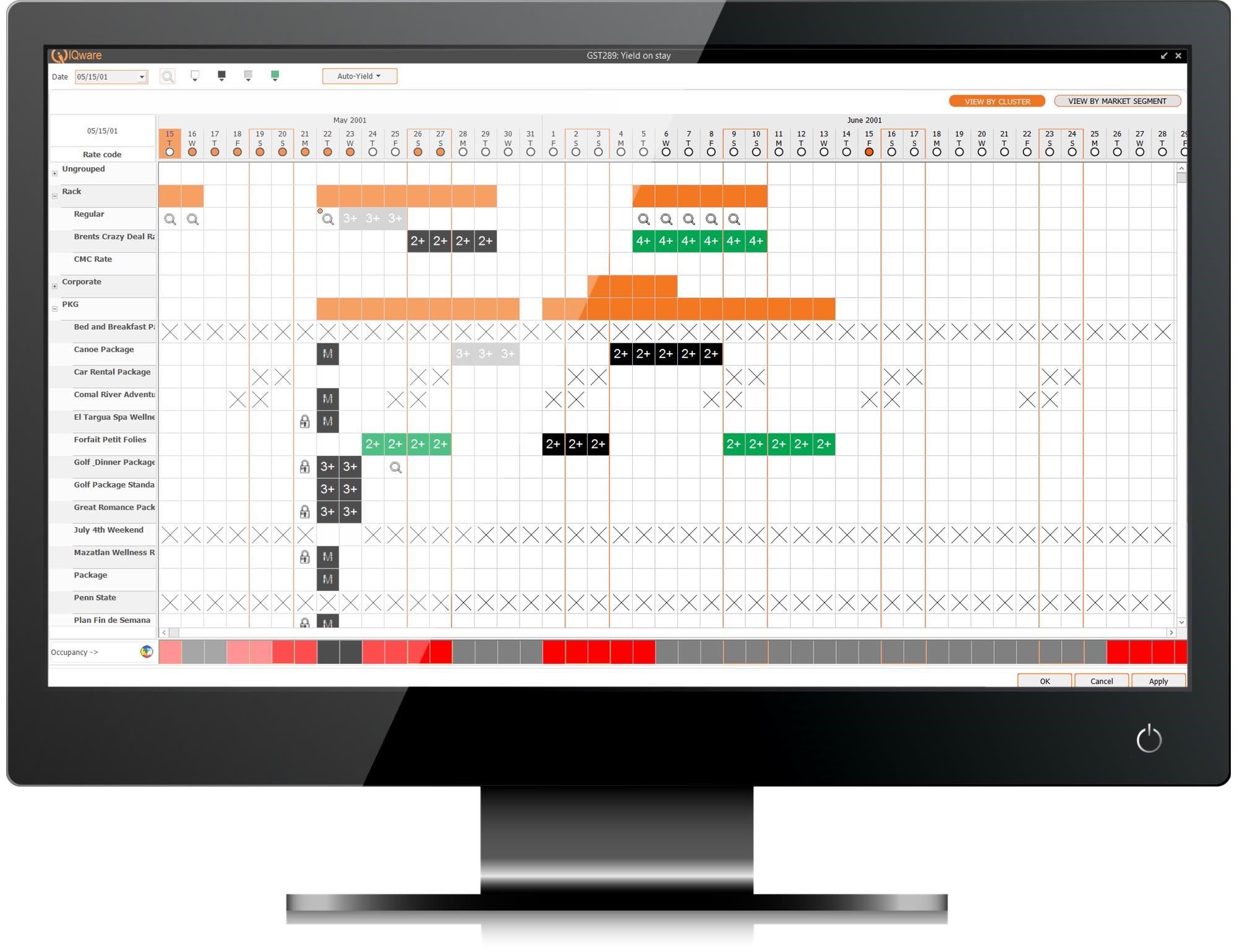
Interface of IQware PMS. Source: IQware
Channel management. Connection to multiple distribution channels is possible with the IQlink Channel Management Tool.
Revenue management. The revenue management module of IQpms has 5 levels of yield control. There’s also a rate management functionality that helps get the most yield out of occupancy levels, days, seasons, and events.
The optional modules that can expand the IQware PMS’s functionality are Activity Booking, Guest Loyalty Program, and Work Order Billing.
Modules for other property types include Timeshare Management, Vacation Club Management, Condo-Hotel Management, and Marina Management. They expand a standard list of features with functions like activities booking or a customized maintenance management module.
Additional IQware products that can be purchased separately are
- Central Reservation System,
- Email Platform,
- Spa Management,
- Point of Sale,
- Sales and Catering, and others.
eZee Absolute
eZee Absolute by eZee Technosys is another industry-recognized, cloud-based software that supports multi-property management and has different integrated pieces to process certain operations. The PMS integrates with 500+ third-party products and has its own property management app for employees and hotel managers.
Front desk and self-service. The front office module supports room allocations (automatic and manual), allows for creating customizable registration cards, helps manage housekeeping staff, and generates night audits. It also has the POS feature connected to process additional payments. Plus, there’s a guest self-service portal that speeds up the check-in process, lets customers send requests directly from their smartphones, and receive receipts online.
CRM and reputation management. The CRM system included in the PMS allows for sending automatic pre-arrival, in-house, and post-departure emails, and manages email marketing campaigns. In addition, eZee Technosys has introduced a sentiment analysis-based Online Reputation Management system that gathers all the guest reviews from different sources like OTAs, TripAdvisor, and other travel websites, making it more convenient to respond to them in real time.
Modules for other property types. eZee Absolute allows users to customize the system for certain types of properties such as resorts, vacation rentals, chains of properties, serviced apartments, etc. For example, the resort software offers the “Pay at Hotel” feature when an online payment link is sent to guests that they can use to make a payment of any amount.
Protel
Protel PMS is a solution that works for both multi-property management of big chains and independent hotels and comes preintegrated with over 1,000 partners. This provider puts a big focus on data security and is fully compliant with the General Data Protection Regulations (GDPR). Protel also boasts their partnership with Amazon AWS making its product reliable, scalable, and secure.
In addition to standard PMS functionality, Protel PMS features
- Billing and Invoicing,
- Housekeeping,
- Reporting and Analytics,
- ID and Passport Scanner, and
- Maintenance.
The Protel PMS’s optional event management module supports organizing conferences, meetings, and other types of events. It provides control over group bookings, equipment bookings, meeting rooms, facilities, and other essential event information.
Systems for vacation rentals, apartments, guest houses, and lodging management
In our blog, we have a number of materials dedicated to managing vacation rentals (e.g., focused channel managers or specifics of alternative accommodation distribution). We’ve also discussed vacation rental PMSs so you can consult that post for a detailed overview.

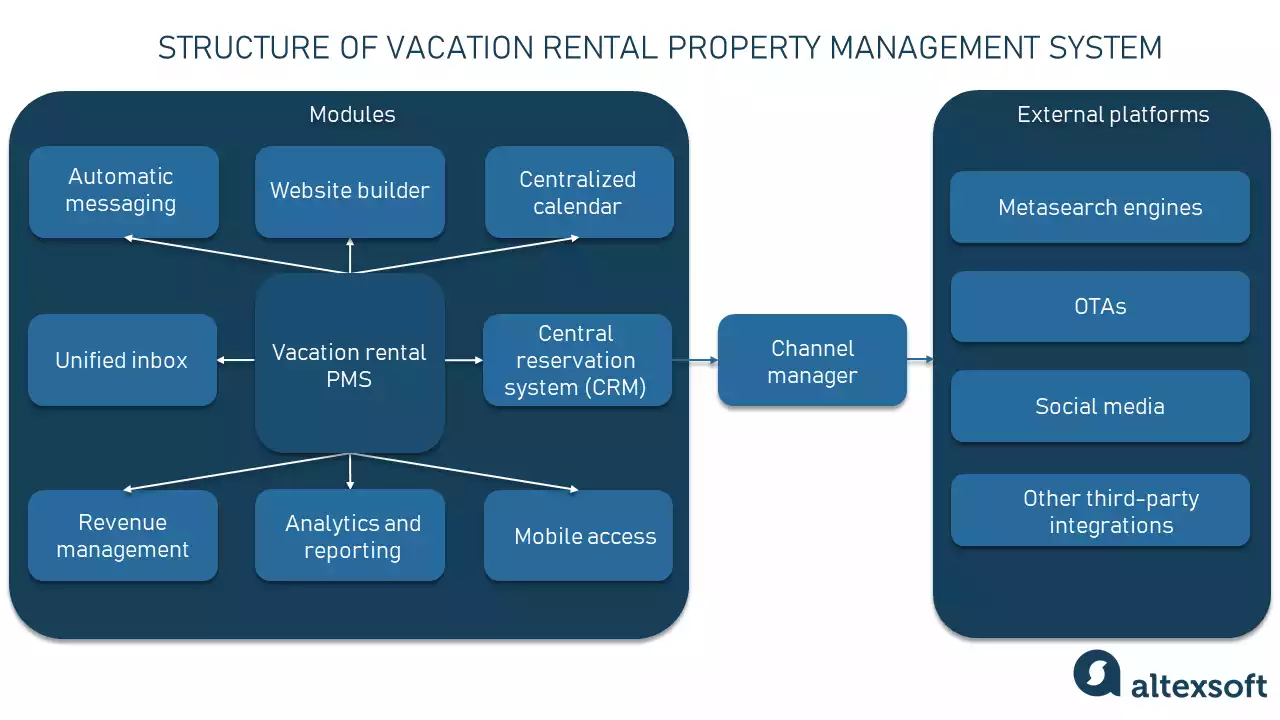
Structure of a vacation rental property management system
In a nutshell, the structure of a vacation rental PMS is similar to that of a hotel but has a bigger focus on distribution management, communication, online presence, and mobile access. Also, in most cases, it must be a multi-property management solution.
Some of the PMSs we discussed above provide vacation rental customizations. However, the hospitality technology market offers specialized products designed for alternative accommodation types. Typically, they have a user-friendly interface for easy, intuitive operation on the go through a mobile app. Let’s look at some of them.

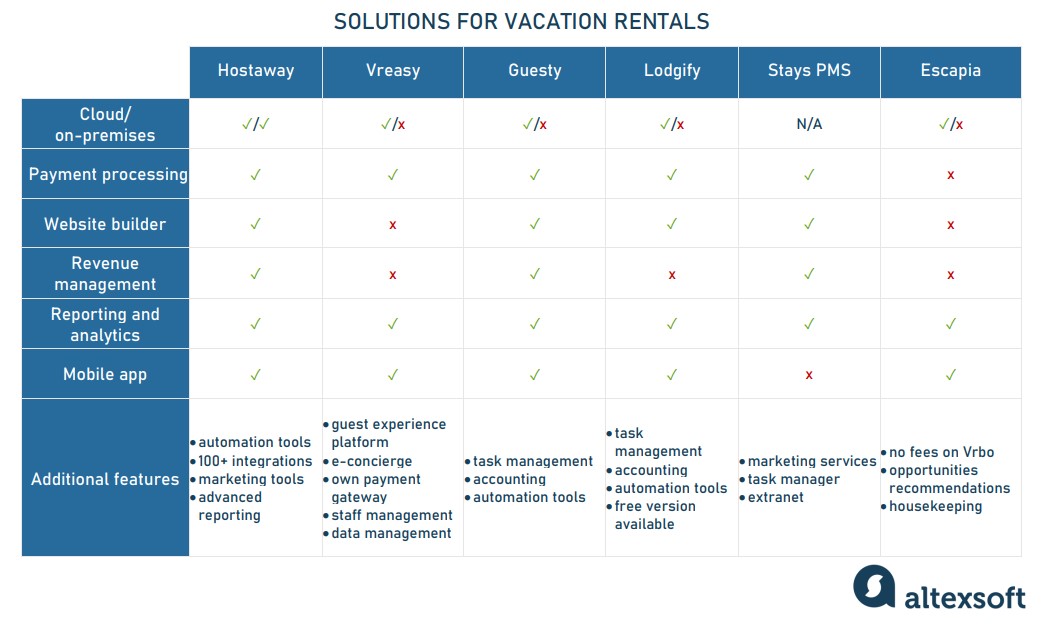
Property management systems for vacation rentals and apartments
Hostaway
Hostaway is an award-winning vacation rental PMS that automates all the daily operations including reservations, marketing, reporting, distribution management, and much more.
Hostaway offers a number of focused automation tools to streamline repetitive tasks related to payments, messaging, or reviews. There are also website building, payment processing, and other handy features included.
It comes pre-integrated with 100+ distribution channels and over 3,000 more integrations are available through Zapier. Users also reported great customer support.
Vreasy
Vreasy has a very intuitive design and a well-developed back-office module with the feature of task delegations to all staff members, from the front office to housekeeping It also offers its own communication platform.
Vreasy PMS has an owner portal with a data management module that has access to multiple data sources and generates reports. This PMS has its own payment gateway – VreasyPay – that accepts credit card payments in 130+ currencies.
Direct APIs from this PMS connect a property to major booking portals, including Airbnb, Booking.com, HomeAway, and TripAdvisor. An inbuilt channel manager helps to efficiently control distribution. Also, Vreasy offers the following features: marketing, activity booking, automated guest mailing, and others.
Vreasy’s Guest experience platform features Guidal, a smart concierge app (check our post dedicated to the hotel concierge software and how it can be beneficial for your hotel). This application unites the functionality of the e-concierge, booking info app, property manual, and a city guide. Guidal has a partnership with tour operators.
Stays PMS
Stays PMS is a Brazilian product that features a channel management system with connection to more than 300 distribution channels, including Airbnb, Booking.com, Expedia, and HomeAway.
Stays PMS has a website management tool that includes integration with Facebook and makes a content management function possible. It has a guest reviews tool, commission management, sales and marketing, and a payment processing tool. Depending on the number of accommodations (from 10 to 1000+), a customer can choose a suitable subscription plan.
Solutions for small hotels, hostels, inns, B&Bs
Such types of hotel properties usually don’t require too many additional modules, like POS services or golf management, due to their size and internal structure. The main components these PMSs should have are an online booking tool, a front-desk solution, and integration to a hotel’s existing reservation platform. Because small hotels may need slightly different functions, the PMS should offer a high level of customization.

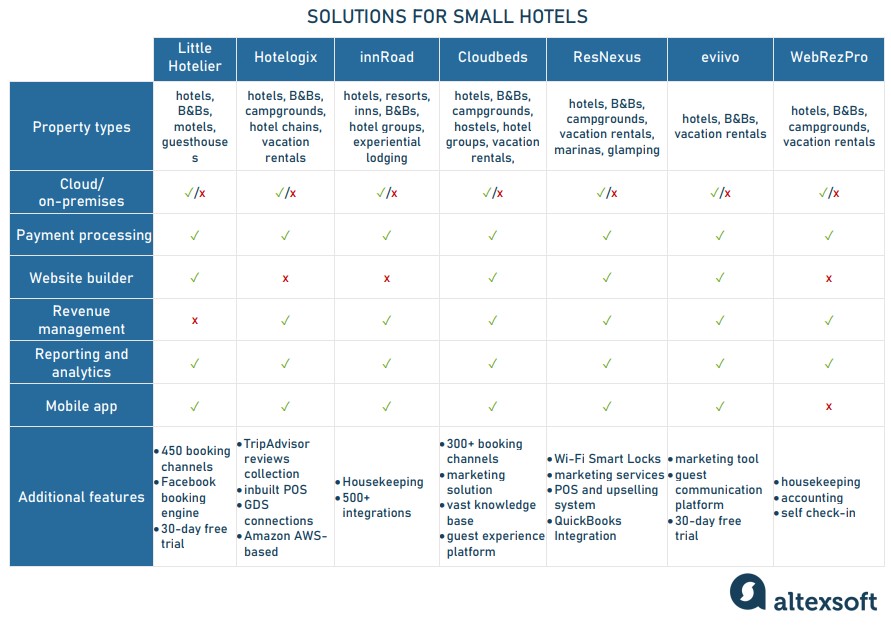
Property management systems for small hotels, hostels, inns, B&Bs
Such systems usually work well not only for small properties but also for other lodging types even including campgrounds, glamping sites, and so on.
Little Hotelier
Little Hotelier is a cloud-based solution for small hotel properties like B&Bs, hostels, and guesthouses. It also has separate offerings for lodges and apartment management.
The PMS is powered by SiteMinder and integrates with this reservation platform. However, it also allows third-party integrations. Little Hotelier combines all necessary modules for a hotel in one PMS:
- Front desk management,
- Reservation management,
- Channel manager with online booking engine,
- Payment processing, and
- Reporting and insights.
Also, Little Hotelier is available in a fully functional mobile version and has a website builder.
This PMS allows for creating not only online reservations, but also reservations by phone or walk-ins that can be made via the front office. The channel manager of Little Hotelier distributes properties to more than 450 booking channels including connection to Airbnb and provides a channel analysis report. The reporting module has convenient dashboards to monitor a hotel’s performance and financials.
Little Hotelier offers a 30-day free trial if you want to test it before subscribing.
Hotelogix
Another PMS for small properties is Hotelogix. It’s also suitable for hotels, serviced apartments, and resorts. It has a strong channel management module with GDS connections, offers third-party integrations with diverse reservation platforms, and enables customization. For example, if you run a hostel, you can select a bed-based reservation management system instead of a room-based one.
Hotelogix PMS offers a Facebook online engine and mobile access from the app for the convenience of a hotel`s team. One more interesting feature of Hotelogix is online reputation management, created in cooperation with TripAdvisor. This tool allows for automating guest feedback collection, so that managers can see the reviews and reply faster.
To test the system, you can sign up for a 15 day free trial.
Localization is also important so interfaces of both Little Hotelier and Hotelogix are available in various languages, and they can process transactions in different currencies.
What’s the future of the hotel PMS?
Technologies in the hospitality industry are constantly developing, offering new functions and modules to optimize daily operations – and meet the newly emerging requirements related to global digitization. So what’s going on with them now?
API-first approach. As experts predict, property management systems switch towards cloud and open API platforms, which lead to a better connection between different modules and will sufficiently improve the speed and quality of data exchange. Check our detailed overview of the main hotel APIs for more information.
AI-powered solutions. The hospitality industry has been adopting AI and Data Science – you can find out more about it in our dedicated article. Hotel property management systems are no exception, especially if we talk about business intelligence, revenue management, and guest service (chatbots and e-concierges).
Internet of Things. We’ve already mentioned the increasing adoption of smart technologies (like in-room controls, facial recognition, etc.). Most of them are based on IoT connections and involve implementation of sensors and other smart devices all of which must be connected to the hotel’s main operation center – the PMS.











